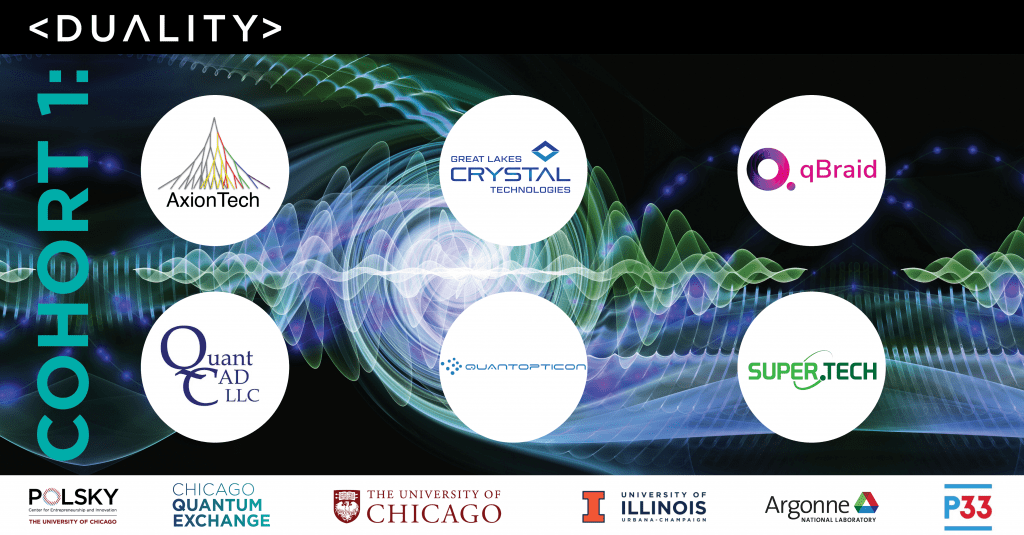Duality will help quantum startups bridge the gap between the laboratory and the marketplace through entrepreneurship training and access to state-of-the-art facilities.
Duality, the nation’s first accelerator exclusively for quantum companies, has accepted six startups for Cohort 1. Duality is led by the Polsky Center for Entrepreneurship and Innovation at the University of Chicago and the Chicago Quantum Exchange (CQE), along with founding partners, the University of Illinois Urbana-Champaign, Argonne National Laboratory, and P33.
Launched in April 2021, Duality is the first-of-its-kind accelerator aimed at supporting next-generation startups focused on quantum science and technology. The 12-month program provides world-class business and entrepreneurship training from the University of Chicago Booth School of Business, Polsky Center, and the opportunity to engage the networks, facilities, and programming from the Chicago Quantum Exchange, the University of Illinois Urbana-Champaign, Argonne National Laboratory, and P33.
“Quantum technologies of the future that address unmet needs with disruptive business models simply cannot be built in isolation,” said Chuck Vallurupalli, the newly appointed senior director of Duality and a seasoned business executive with over 20 years of experience scaling startups. “We are pleased to welcome six startups into the inaugural cohort of Duality and offer them a unique set of resources to help them grow.”
The six companies selected for Cohort 1 of Duality are:
- Axion Technologies, a Tallahassee, FL-based company led by Carol Scarlett, is developing a quantum random number generator for high-performance computing systems.
- Great Lakes Crystal Technologies, an East Lansing, MI-based company led by Keith Evans, is developing a commercial manufacturing process for semiconductor-grade diamond materials for photonics, electronics, and quantum technology applications.
- qBraid, a Hanover, NH-based company led by Kanav Setia, is developing a cloud-based platform for managed access to other quantum computing software and hardware.
- QuantCAD, an Iowa City, Iowa-based company led by Michael Flatte, is developing simulation software for modeling noise and current in quantum devices such as high-resolution quantum sensors.
- Quantopticon, a Guildford, UK-based company led by Mirella Koleva, is developing simulation software for designing and optimizing quantum optical devices.
- Super.tech, a Chicago, IL-based company led by Pranav Gokhale, is developing software that accelerates quantum computing applications by optimizing across the system stack from algorithms to control pulses.
These companies were selected from a competitive pool of applicants from all over the globe and vetted by an internal review process. The selected ventures were approved by Duality’s Governing Board.
“On behalf of the Governing Board, I am excited to welcome this inaugural cohort of innovators to Duality,” said Juan de Pablo, vice president for national laboratories, science strategy, innovation, and global initiatives at the University of Chicago and chair of the Duality Governing Board. “We look forward to providing them with critical support from the University of Chicago and our Duality partners to help them unlock the potential of quantum technology and grow their companies.”
“These six startups represent a diverse set of quantum-enabling technologies and applications,” said Susan Martinis, vice chancellor for research and innovation at the University of Illinois Urbana-Champaign and vice chair of the Duality Governing Board. “I am eager for the companies in this cohort to work closely with our quantum experts at the University of Illinois and in the region to further develop and refine their business models.”
Through Duality, each startup in Cohort 1 will receive $50,000 in unrestricted funding and mentorship from top quantum experts. Selected startups will have the opportunity to explore partnerships with and access to some of the region’s state-of-the-art equipment and facilities for advanced computing, nanofabrication, atomic scale measurement, quantum testbeds, and other premier resources from the University of Chicago, University of Illinois Urbana-Champaign, and Argonne National Laboratory. The region has become a burgeoning hub for quantum technology and new venture creation and is home to three of eight federally funded Department of Energy and National Science Foundation quantum research centers, including Q-NEXT, led by Argonne National Laboratory, Superconducting Quantum Materials and Systems Center (SQMS), led by Fermi National Accelerator Laboratory, and Hybrid Quantum Architectures and Networks (HQAN), led by the University of Illinois Urbana-Champaign.
“We’re excited to be working with Duality and their cohort of startups, to foster the development of breakthrough technologies and quantum solutions,” said Michael Brett worldwide business development leader for quantum computing at Amazon Web Services (AWS), one of the corporate supporters for Duality. “Duality’s approach to accelerating innovation in quantum computing with strong ties to research and academic organizations makes a lot of sense. AWS shares Duality’s commitment to collaborate with startups, national labs, and research organizations to help the entire quantum industry develop more useful technologies for customers, faster.”
“Resources provided through Duality will be game-changing for these early-stage ventures,” said Dan Caruso, executive chairman of ColdQuanta and managing director of Caruso Ventures, which is also one of the corporate partners for Duality. “By providing customized expertise and guidance, we can help these companies reach critical milestones in this fast-growing area.”
The programming for Cohort 1 of Duality officially kicked off this week with remote learning due to COVID-19 considerations, but the plan is to transition to in-person learning and bring each of the companies to Chicago later this year.

